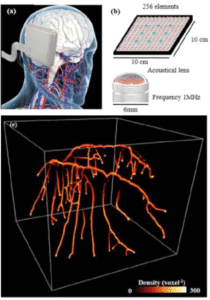
Postdoctoral position – Toward Ultrasensitive 3D Ultrasound Localization Microscopy for Whole-Organ and Clinical Translation
Topic
 Dysfunctions in the microcirculation are early markers of many diseases, yet diagnosis typically occurs only at later stages, when macroscopic symptoms emerge.
Dysfunctions in the microcirculation are early markers of many diseases, yet diagnosis typically occurs only at later stages, when macroscopic symptoms emerge.
Mapping blood flows across multiple spatial scales deep within organs is therefore crucial for early diagnosis and disease monitoring, but remains a major challenge in clinical medical imaging.
Our laboratory, Physics for Medicine Paris, pioneered ultrasound localization microscopy (ULM) in 2015 (Errico et al., Nature, 2015), the first non-invasive approach capable of mapping and quantifying blood flows at depth in living organs with micron-scale resolution. While 2D ULM has demonstrated breakthrough potential, it is highly operator-dependent, as probe positioning is critical and limits reproducibility. Extending ULM to robust, volumetric (3D/4D) imaging is a decisive step toward clinical translation.
However, capturing large 3D volumes through challenging acoustic windows such as the skull or rib cage remains an unsolved problem. Bone-induced acoustic energy losses, wavefront distortion, and physiological motion artifacts (e.g., respiration) drastically reduce sensitivity and destroy signal coherence.
Objective
The postdoctoral researcher will lead the development of next-generation ultrasensitive 3D/4D ULM, leveraging novel ultrasonic multi-lens probe technology (Favre et al PMB 2023; Haidour et al Nature Com 2025), ultrafast acquisition sequences, and advanced signal processing. The aim is to achieve whole-organ vascular mapping at microscopic resolution, overcoming the physical and physiological limitations that currently hinder translation to humans
Candidate Profile
- PhD in biomedical engineering, medical imaging, physics, or related field
- Strong background in ultrasound, signal processing, or computational imaging
- Experience with programming (e.g., MATLAB), preferably in imaging applications
- Demonstrated ability to lead projects and collaborate across disciplines
- Motivation to contribute to translational research with clinical perspectives
Research Plan
The postdoc will:
- Develop advanced ultrafast acquisition sequences that maximize sensitivity and spatiotemporal resolution under challenging imaging conditions
- Innovate in 3D/4D ULM post-processing, integrating beamforming and motion correction
- In vitro using complex flow phantoms designed to mimic human organs and physiological motion
- In vivo targeting clinically relevant organs such as the liver
- Contribute to translational readiness, assessing feasibility for clinical deployment in cerebrovascular and hepatic disease imaging
Duration: 12-24 months (expected start: early 2026)
Location: Institute Physics for Medicine Paris, 2-10 rue d’Oradour-sur-Glane, 75015 Paris
Contact: clement.papadacci@espci.fr





